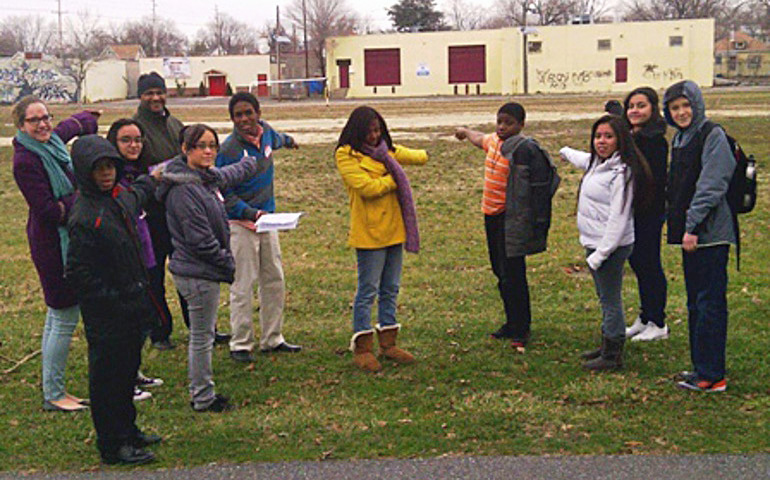
Student leaders, the Rev. Ed Livingston, director of Camden Churches Organized for People, Franciscan volunteer Lauryn Klingler, and participants in the Martin Luther King Day of Community Organizing point out a warehouse by Von Nieda Park that needs graffiti removed. (Student Leaders' Von Nieda Park Task Force)
This year to mark Martin Luther King Jr. Day, seventh- and eighth-graders at St. Anthony of Padua school in Camden, N.J., took their commemoration of the civil rights leader Monday outdoors to Von Nieda Park, site of their exercise in transformation that has been long in arriving but very noticeable.
The park was an eyesore when Fr. Jud Weiksnar arrived at St. Anthony Church in 2005. The Franciscan, a lawyer before he was ordained, tried for six years to get Camden officials to do something about the park's graffiti, broken equipment and trash. In 2011, Weiksnar took over a civic engagement class the school ran in the summer months. With the approval of the teaching staff, he turned the emphasis from civics to community organizing.
The youth took up his interest in the park, but it wasn't until he decided to take three of the students from the class with him to a meeting of city officials that things got rolling. The youngsters took over the meeting, impressing city officials not only with their passion but with their clear articulation of the problem and what they saw as solutions.
"Here I had a law degree, I had studied public policy," Weiksnar said. Everyone told him things wouldn't change, he said, and they didn't until he took the youthful lobbyists with him. "They ended up basically taking over the meeting," he said.
Out of that experience grew a longer-term relationship between students in the Student Leaders' Von Nieda Park Task Force, officials on Camden City Council and several city agencies. In the last year and a half, students in the task force have met once a month at a community center at the park with city officials. Once a month on a Thursday afternoon, the pastor takes his laptop to the school and meets with the student leaders. He helps them develop an agenda for the next day's meeting. The youngsters run the meetings, present their cases for anything from new basketball nets to repainted benches and listen to the officials' response. They run the meetings and make sure the proceedings run efficiently, because they only have an hour before they have to return to class.
That anything gets done is testament to the students' persuasive powers in a city known for being broken. Camden is perennially on the wrong end of all the statistics measuring a city's health, with high crime rates, unemployment and, last year, a record number of murders.
"It's not easy being a pastor in Camden," Weiksnar said. "But when you've got a group of kids like this, it helps you keep the hope alive."
The task force isn't for everyone, Weiksnar said. The students "have to do research and be focused." And as 13-year-old Genesis Santana put it, you have to accept responsibility, "and you need to be able to control your temper. Sometimes you need to keep yourself in check because you don't always get what you want."
Santana, president of the student council, said the city is currently doing some work to alleviate a flooding problem. But the task force, affiliated with the larger Camden Churches Organized for People, has begun to work on a far more ambitious project: They want the city to upgrade the lighting at the park and to provide police patrols, which currently function only from 8 a.m. to 8 p.m., throughout the night.
"That's when most of the crime and drug use occurs," Santana said. When the students raised the issues, she said they received "mixed answers," and when asked what comes next, she said, "We're still striving."
At Monday's gathering at Von Nieda Park, the task force got a commitment from their county council representative to improve the park's lighting, increase police protection and look into surveillance video cameras for the park, moves Weiksnar called "significant victories for our students and our neighborhood."
The group has received awards and citations from local and state levels of government, and it was one of five groups nationwide to receive a Youth Service Challenge award for environmental work through the Jefferson Awards for Public Service.
In July, the task force visited Washington to give a presentation, "Community Organizing: You're Never Too Young," at the Department of Health and Human Services' Center for Faith-based and Neighborhood Partnerships.
In their presentations, the students emphasize the difference between community service and community organizing. As described on their website, they see the latter "as a more powerful vehicle for long-lasting change."
Along the way, Weiksnar said they come to understand and to identify issues they think important and upon which they can have an impact. They know to find out who has the power -- to replace old basketball nets, take care of graffiti or have trash hauled away -- and they build long-term relationships through the meetings and dialogue. They learn to articulate their concerns.
"I think they feel empowered," Weiksnar said.
On a recent Saturday, he recalled, the task force was doing a practice run of the tour of the park when one student noticed the basketball nets were ripped or gone. They had the name of the person in charge of such things at city hall and made the call. A few days later, the nets were changed.
Weiksnar said the students love to joke: "The things that took Father Jud six years to do, we get done in 48 hours."
[Tom Roberts is NCR editor at large. His email address is troberts@ncronline.org.]




